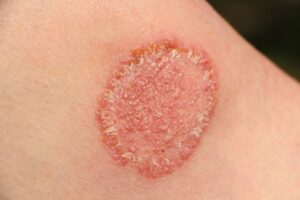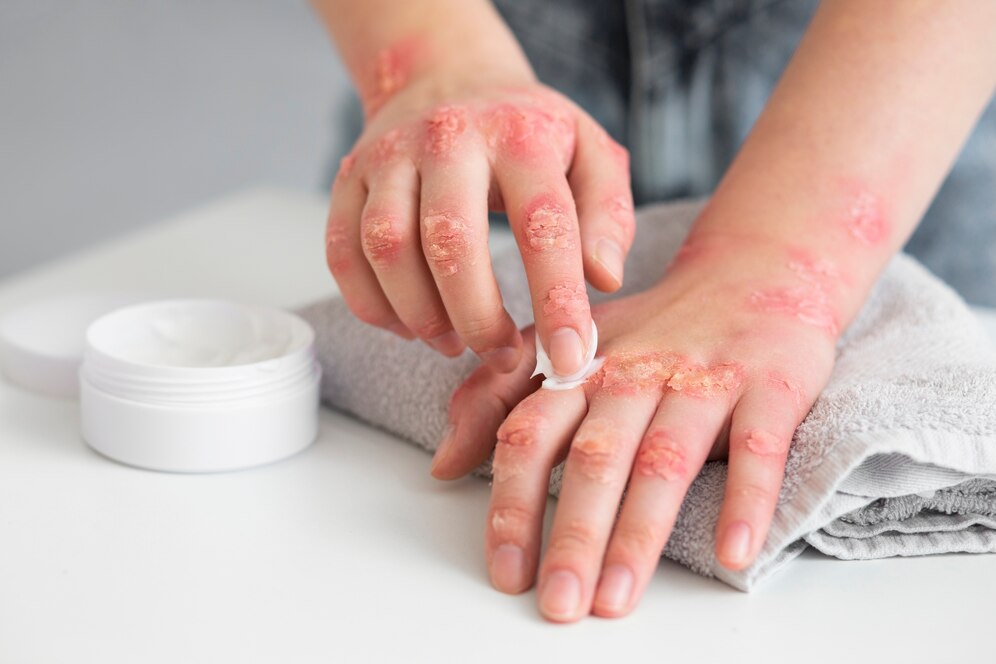Last updated on May 8th, 2025 at 05:07 pm
Fungal infection treatment encompasses a wide range of approaches and therapies aimed at combating fungal invaders that can affect various parts of the body. Fungal infections are a common concern affecting millions of people worldwide.
Two of the most prevalent forms of fungal infections are fungal nail infections and fungal skin infections. These conditions can be both uncomfortable and unsightly, but the good news is that effective fungal infection treatment treatments are available.
Fungal Infection Treatment
The choice of treatment for fungal infections depends on several factors, including the type and severity of the infection, the affected body part, and the patient’s overall health. Here are common approaches to fungal infection treatment:
Topical Antifungal Medications: For superficial skin infections like athlete’s foot and ringworm, over-the-counter (OTC) antifungal creams, ointments, and powders can be effective. Apply these as directed until the infection clears.
Prescription-Strength Topical Medications: In cases of severe or persistent infections, a healthcare provider may prescribe stronger topical antifungal medications. These are typically required for nail infections or when OTC treatments are ineffective.
Oral Antifungal Medications: For systemic infections or severe cases, oral antifungal medications are often necessary. Common oral antifungals include terbinafine, itraconazole, and fluconazole. These medications may require several weeks or even months of treatment.
Home Remedies: Some people explore natural remedies like tea tree oil, apple cider vinegar, or yoghurt for fungal infections. While these remedies may provide relief, they are not a substitute for medical treatment and should be used with caution.
Read: What are Generic Medicines?
Fungal Nail Infection Treatment
Fungal nail infections, also known as onychomycosis, occur when fungi invade the nails, leading to discolouration, thickening, and brittleness. This condition can affect both the toenails as well as fingernails. Prompt fungal infection treatment is essential to prevent further complications as they can be persistent.
Topical Antifungal Medications: Over-the-counter (OTC) topical antifungal creams, ointments, and nail lacquers are available to treat mild fungal nail infections. For more severe cases, prescription-strength topical medications may be necessary, often requiring long-term use.
Oral Antifungal Medications: In cases of severe or stubborn fungal nail infections, oral antifungal medications prescribed by a healthcare professional may be necessary. These medications are typically taken for several months to promote the growth of healthy nails.
Laser Therapy: Laser treatment is an emerging option for fungal nail infection treatment, offering a non-invasive approach to destroy the fungus.
Surgical Intervention: In extreme cases, surgical removal of the affected nail may be considered.

Fungal Skin Infection Treatment
Fungal skin infections encompass a wide range of conditions, including athlete’s foot, ringworm, jock itch, and yeast infections. These infections typically manifest as red, itchy rashes and can affect various parts of the body.
Topical Antifungal Creams: Over-the-counter antifungal creams and ointments are effective for treating most fungal skin infections. These products usually contain active ingredients such as miconazole, clotrimazole, or terbinafine.
Prescription Medications: For severe or resistant fungal skin infections, a healthcare provider may prescribe stronger topical medications or oral antifungal drugs.
> Consult a doctor and Order Medicine Online
Keeping the Affected Area Clean and Dry: Good hygiene practices, such as keeping the infected area clean and dry, can aid in the recovery process and prevent recurrence.
Avoiding Irritating Substances: Individuals with fungal skin infections should avoid using harsh soaps or wearing tight, non-breathable clothing, as these can exacerbate the condition.
Prevention: Reducing the risk of fungal skin infections involves maintaining good personal hygiene, wearing breathable clothing, and avoiding sharing personal items.
Conclusion:
Fungal infections can be both uncomfortable and unsightly, but the good news is that effective treatments are available for fungal nail and skin infections. Whether you’re dealing with a stubborn nail fungus or an itchy skin rash, seeking prompt treatment and following your healthcare provider’s recommendations are crucial for a successful recovery.
Remember that prevention is often the best approach. Maintaining good hygiene practices, wearing breathable clothing, and being cautious in communal areas like locker rooms can help reduce your risk of fungal infections. If you suspect you have a fungal infection, consult a healthcare professional for a proper diagnosis and treatment plan tailored to your specific condition. With the right approach, you can regain healthy nails and skin, free from the discomfort of fungal infections.
FAQs on Fungal Infection Treatment
Q.1 What is fungal infection treatment?
Fungal infection treatment refers to the medical interventions and remedies employed to combat fungal infections caused by various types of fungi. These treatments can include topical or oral antifungal medications, surgical interventions, and preventive measures to alleviate and eliminate fungal infections in different parts of the body.
Q.2 How long does it typically take to treat a fungal nail infection?
Fungal nail infections can be stubborn and may require several months of treatment, whether using topical antifungal agents or oral medications. Consistency and patience are key to successful resolution.
Q.3 Are there any natural remedies that can help with fungal skin infections?
Some natural remedies like tea tree oil or garlic may offer relief for mild fungal skin infections, but they are not a substitute for prescribed antifungal treatments, especially for severe infections.
Q.4 Can over-the-counter antifungal creams treat all types of fungal infections?
Over-the-counter antifungal creams are effective for superficial skin infections like athlete’s foot and ringworm. However, more severe or nail infections often require prescription-strength treatments for complete eradication.
Related Links:
